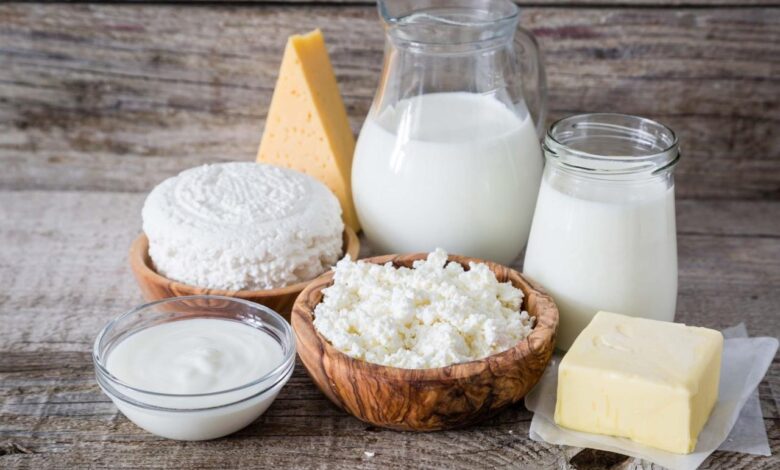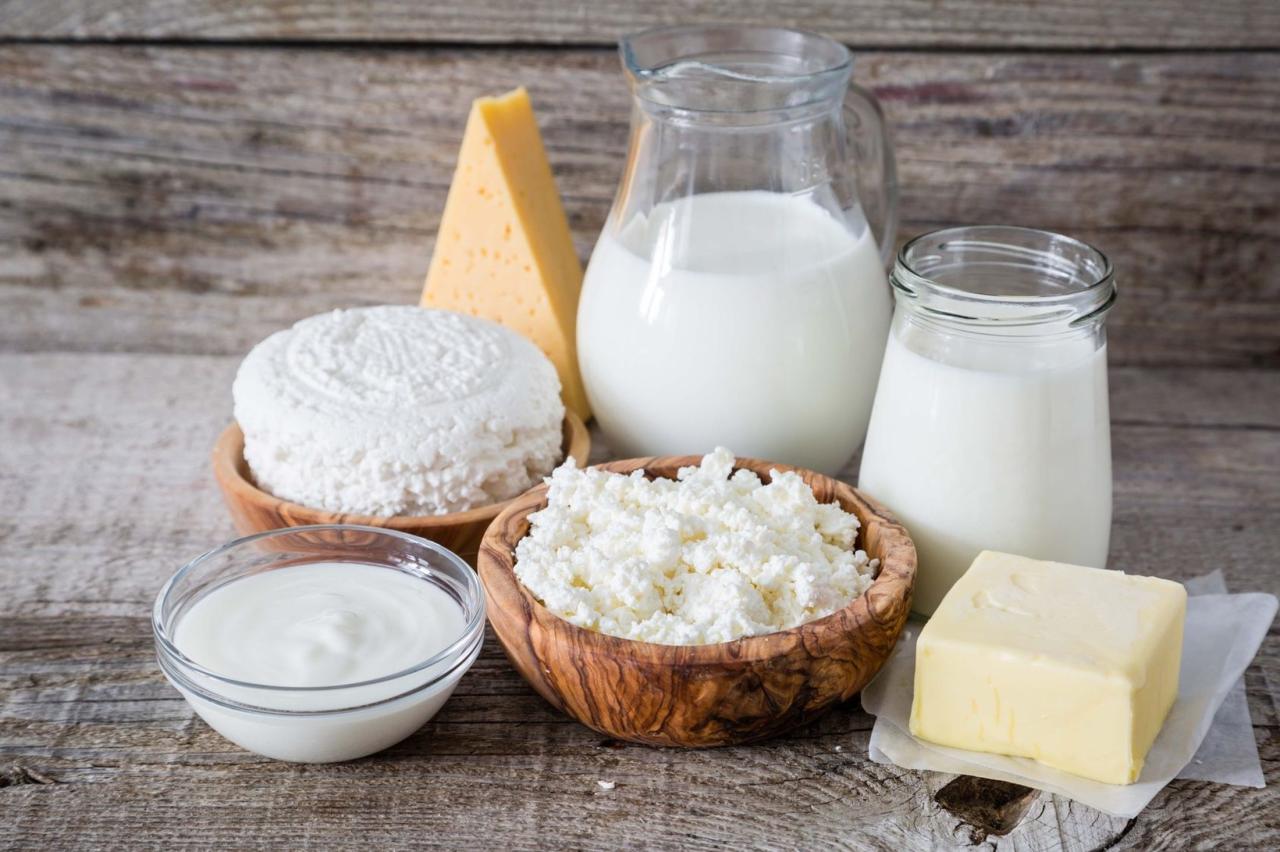
Is Dairy Good for You: Exploring the Benefits and Risks
Is dairy good for you? This question has sparked countless debates, with passionate advocates on both sides. Dairy products have been a staple in human diets for centuries, providing a rich source of essential nutrients. But with growing concerns about health and environmental impacts, the question of whether dairy is truly beneficial has become increasingly complex.
This blog post delves into the world of dairy, exploring its nutritional value, potential health benefits, and drawbacks. We’ll examine the science behind dairy’s impact on bone health, heart health, and other health conditions. We’ll also explore dairy alternatives and provide recommendations for incorporating dairy into a balanced diet.
Nutritional Benefits of Dairy
Dairy products are a significant source of essential nutrients that contribute to overall health and well-being. These products, including milk, yogurt, cheese, and others, offer a rich blend of nutrients that play crucial roles in maintaining bone health, supporting muscle growth, and boosting the immune system.
Calcium and Bone Health
Calcium is a vital mineral that plays a crucial role in bone health. Dairy products are excellent sources of calcium, contributing to bone density and strength. Calcium helps build and maintain strong bones, reducing the risk of osteoporosis, a condition characterized by weak and brittle bones.
- Milk is an excellent source of calcium, with one cup providing approximately 300 milligrams of calcium, which is about 30% of the daily recommended intake for adults.
- Yogurt is another great source of calcium, with a cup of plain yogurt containing about 450 milligrams of calcium, exceeding the daily requirement for many individuals.
- Cheese, particularly hard cheeses like cheddar and Parmesan, are rich in calcium, with one ounce of cheddar cheese providing about 200 milligrams of calcium.
Vitamin D and Bone Health
Vitamin D is another essential nutrient for bone health. It aids in calcium absorption, ensuring that the body can effectively utilize calcium for bone formation and maintenance. Many dairy products are fortified with vitamin D, making them a convenient source of this vital nutrient.
- Milk is often fortified with vitamin D, with one cup providing around 100 IU (international units) of vitamin D, which is a significant portion of the daily recommended intake.
- Yogurt is also often fortified with vitamin D, with a cup of plain yogurt containing about 100 IU of vitamin D, contributing to overall vitamin D intake.
Protein and Muscle Growth
Protein is essential for muscle growth and repair. Dairy products are a good source of protein, contributing to muscle mass and strength. Protein helps build and maintain muscle tissue, promoting physical performance and overall well-being.
- Milk is a good source of protein, with one cup providing about 8 grams of protein, contributing to daily protein intake.
- Yogurt is another excellent source of protein, with a cup of plain yogurt containing about 10 grams of protein, making it a valuable addition to a balanced diet.
- Cheese, especially cottage cheese, is rich in protein, with one cup of cottage cheese providing about 28 grams of protein, making it a protein-rich snack or meal component.
Dairy and Bone Health: Is Dairy Good For You
Dairy products are often touted for their bone-strengthening properties, and for good reason. They are rich sources of calcium and vitamin D, two essential nutrients for maintaining strong and healthy bones.
Calcium’s Role in Bone Health
Calcium is the primary mineral component of bones, making up about 99% of the body’s total calcium content. It plays a crucial role in bone formation and maintenance, ensuring their strength and density. During childhood and adolescence, calcium intake is essential for building strong bones that can withstand the stresses of growth and development.
In adulthood, calcium helps to maintain bone density and prevent bone loss.
Vitamin D’s Role in Calcium Absorption
While calcium is essential for bone health, our bodies cannot absorb it efficiently without adequate vitamin D. Vitamin D acts as a facilitator, enabling the intestines to absorb calcium effectively. It also plays a role in bone remodeling, a process that involves breaking down old bone tissue and replacing it with new bone.
Dairy Consumption and Osteoporosis
Osteoporosis is a condition characterized by weak and brittle bones, increasing the risk of fractures. Studies have consistently shown a link between dairy consumption and a reduced risk of osteoporosis.
Research Supporting Dairy’s Impact on Bone Health
Numerous research studies have confirmed the positive impact of dairy consumption on bone health.
- A large-scale meta-analysis of 17 studies, published in the American Journal of Clinical Nutrition, found that higher dairy intake was associated with a lower risk of hip fractures in both men and women.
- Another study, published in the journal Osteoporosis International, found that dairy consumption was associated with increased bone mineral density in both young adults and older adults.
Dairy and Cardiovascular Health
Dairy products have long been a staple in many diets, but their impact on heart health has been a subject of debate. While some studies suggest potential benefits, others raise concerns about potential risks. Understanding the complex relationship between dairy and cardiovascular health requires considering various factors, including the type of dairy product, the amount consumed, and individual health conditions.
Effects of Different Dairy Products
The impact of dairy on heart health can vary depending on the type of dairy product consumed. Full-fat dairy products, such as whole milk and butter, are higher in saturated fat, which has been linked to increased cholesterol levels and an elevated risk of heart disease.
However, full-fat dairy products also contain beneficial nutrients, such as conjugated linoleic acid (CLA), which may have anti-inflammatory effects and potentially reduce the risk of heart disease.Low-fat dairy products, such as skim milk and low-fat yogurt, are generally considered healthier for the heart as they contain less saturated fat.
However, some studies have suggested that low-fat dairy products may not provide the same benefits as full-fat dairy products, and may even be associated with an increased risk of certain health conditions.
Factors Influencing Dairy and Cardiovascular Health
Several factors can influence the relationship between dairy consumption and cardiovascular health:
- Dietary Pattern:The overall dietary pattern plays a crucial role in heart health. Consuming a balanced diet rich in fruits, vegetables, and whole grains, while limiting processed foods and saturated fat, is essential for maintaining cardiovascular health.
- Genetic Predisposition:Individuals with a genetic predisposition to heart disease may be more susceptible to the negative effects of saturated fat, regardless of the source.
- Individual Health Conditions:Certain health conditions, such as high cholesterol or diabetes, can influence the relationship between dairy consumption and cardiovascular health.
- Dairy Processing:Some dairy products, such as processed cheese and flavored yogurt, may contain added sugars, sodium, and unhealthy fats that can negatively impact heart health.
Dairy and Blood Pressure
Dairy products contain potassium, which is a mineral that can help lower blood pressure. Some studies have shown that consuming dairy products, particularly low-fat yogurt, may be associated with a reduced risk of hypertension. However, more research is needed to confirm these findings.
Dairy is a great source of calcium and protein, but it can also be high in fat and calories. If you’re looking for a healthy way to enjoy pizza, check out 11 healthy pizzas under 400 calories. These recipes use low-fat cheese and whole-wheat crusts, so you can enjoy a delicious slice without feeling guilty.
And remember, moderation is key! Whether you’re choosing dairy or pizza, finding a balance that works for you is the best way to stay healthy.
Dairy and Cholesterol
Dairy products contain both saturated and unsaturated fats. Saturated fat can raise LDL (“bad”) cholesterol levels, which can increase the risk of heart disease. However, some dairy products, such as full-fat yogurt and cheese, also contain CLA, which may help lower LDL cholesterol and increase HDL (“good”) cholesterol levels.
Whether dairy is good for you is a complex question, depending on individual needs and preferences. If you’re looking to shed some pounds, 10 Simple Changes That Lead to Weight Loss might be a better starting point. These changes often involve reducing processed foods and sugary drinks, which can help with weight management.
As for dairy, moderation is key, and choosing low-fat options can help you maintain a healthy weight.
The effects of dairy on cholesterol levels can vary depending on the type of dairy product consumed, the amount consumed, and individual factors.
Dairy and Inflammation
Chronic inflammation is a key factor in the development of heart disease. Some studies have suggested that dairy products, particularly full-fat dairy products, may have anti-inflammatory effects due to their content of CLA. However, more research is needed to confirm these findings.
Dairy and Heart Disease Risk
The relationship between dairy consumption and heart disease risk is complex and not fully understood. Some studies have shown that consuming dairy products, particularly low-fat dairy products, may be associated with a reduced risk of heart disease. However, other studies have shown no association or even an increased risk, depending on the type of dairy product consumed and other factors.
More research is needed to clarify the role of dairy in heart health.
The debate about dairy’s role in a healthy diet continues, but one thing’s for sure: a balanced plate is key! And that means making sure you’re getting enough vegetables. Check out these 5 ways to up your vegetable game to ensure you’re getting the nutrients your body needs.
Once you’ve got your veggie game on point, you can then make informed choices about dairy based on your individual needs and preferences.
Dairy and Other Health Conditions
Dairy consumption can be a source of nutrients, but its impact on health can vary depending on individual circumstances. Certain health conditions may necessitate careful consideration of dairy intake.
Lactose Intolerance
Lactose intolerance is a common condition where the body cannot properly digest lactose, a sugar found in dairy products. This is due to a deficiency of the enzyme lactase, which breaks down lactose. Symptoms of lactose intolerance can include bloating, gas, diarrhea, and abdominal cramps.
Individuals with lactose intolerance can manage their symptoms by limiting or avoiding dairy products or by choosing lactose-free alternatives.
Diabetes
Dairy products can be incorporated into a balanced diet for individuals with diabetes. However, it is important to choose low-fat or fat-free options and to consider the carbohydrate content of dairy products. Some dairy products, such as yogurt and cheese, can be beneficial for blood sugar control due to their protein and probiotic content.
Allergies
Dairy allergies are a common food allergy, particularly in children. Symptoms of a dairy allergy can range from mild to severe and can include hives, itching, swelling, wheezing, and vomiting. Individuals with dairy allergies need to avoid all dairy products and their derivatives.
Weight Management
Dairy can play a role in weight management. High-protein dairy products, such as Greek yogurt, can help with satiety and may promote weight loss. However, it is essential to choose low-fat or fat-free options and to consume dairy in moderation as part of a balanced diet and exercise plan.
Gut Health
Some dairy products, such as yogurt and kefir, contain probiotics, which are live bacteria that can benefit gut health. Probiotics may help to improve digestion, reduce symptoms of irritable bowel syndrome (IBS), and boost the immune system. However, the effects of probiotics can vary depending on the individual and the type of probiotic consumed.
Dairy and Medications
Dairy products can interact with certain medications. For example, dairy can interfere with the absorption of some antibiotics. It is essential to consult with a healthcare professional to determine if any medications you are taking interact with dairy products.
Dairy Alternatives
Dairy alternatives are plant-based products designed to mimic the taste, texture, and functionality of dairy products. These alternatives have become increasingly popular due to factors like dietary restrictions, environmental concerns, and personal preferences.
Types of Dairy Alternatives
Plant-based alternatives are made from a variety of sources, each offering unique characteristics and nutritional profiles.
- Soy Milk: Soy milk is made from soybeans and is a good source of protein, calcium, and iron. It’s often fortified with vitamins and minerals to match the nutritional content of cow’s milk.
- Almond Milk: Almond milk is made from almonds and is low in calories and fat. It’s naturally sweet and has a nutty flavor. However, it’s lower in protein and calcium than other alternatives.
- Oat Milk: Oat milk is made from oats and is naturally creamy and slightly sweet. It’s a good source of fiber and has a mild flavor that makes it suitable for various uses.
- Coconut Milk: Coconut milk is made from the flesh of coconuts and is known for its rich, creamy texture and slightly sweet flavor. It’s a good source of healthy fats and is often used in cooking.
- Rice Milk: Rice milk is made from rice and is hypoallergenic, making it suitable for people with allergies to dairy, soy, and nuts. It’s naturally sweet and has a mild flavor.
- Cashew Milk: Cashew milk is made from cashews and is known for its creamy texture and slightly sweet flavor. It’s a good source of protein and healthy fats.
Nutritional Comparison
Dairy and plant-based alternatives differ in their nutritional profiles.
- Protein: Cow’s milk is a good source of complete protein, containing all essential amino acids. While soy milk is also a good source of protein, other alternatives like almond and rice milk are lower in protein.
- Calcium: Cow’s milk is rich in calcium, an essential mineral for bone health. Most plant-based alternatives are fortified with calcium to match the content of cow’s milk.
- Vitamins: Cow’s milk contains vitamin D and vitamin B12, which are not naturally present in many plant-based alternatives. Some alternatives are fortified with these vitamins, while others require supplementation.
- Fats: The fat content of dairy and plant-based alternatives varies. Cow’s milk contains saturated fat, while some alternatives like almond milk are low in fat. Coconut milk is high in saturated fat, while cashew milk contains healthy unsaturated fats.
- Fiber: Plant-based alternatives are generally higher in fiber than cow’s milk, which can contribute to digestive health.
Environmental Impact
The production of dairy and plant-based alternatives has different environmental impacts.
- Land Use: Dairy farming requires significant land for grazing and feed production, which can contribute to deforestation and habitat loss. Plant-based alternatives, particularly almond milk, can also have a large land footprint due to water-intensive almond cultivation.
- Water Use: Dairy production requires large amounts of water for livestock and feed crops. Almond milk production also has a high water footprint. Oat milk and soy milk generally have a lower water footprint compared to almond milk.
- Greenhouse Gas Emissions: Dairy farming contributes to greenhouse gas emissions, particularly methane, which is a potent greenhouse gas. Plant-based alternatives generally have a lower carbon footprint, with soy milk and oat milk being among the most sustainable options.
Suitability for Different Needs
Dairy alternatives can be suitable for various dietary needs and preferences.
- Lactose Intolerance: People with lactose intolerance cannot digest lactose, a sugar found in dairy products. Plant-based alternatives are lactose-free and a suitable option for those with this condition.
- Dairy Allergies: Some people are allergic to dairy proteins, such as casein and whey. Plant-based alternatives are a safe and suitable alternative for those with dairy allergies.
- Veganism: Vegans avoid all animal products, including dairy. Plant-based alternatives are essential for vegans to meet their nutritional needs.
- Environmental Concerns: Consumers concerned about the environmental impact of dairy production may choose plant-based alternatives as a more sustainable option.
- Health Goals: Plant-based alternatives can be incorporated into a healthy diet to reduce saturated fat intake or increase fiber consumption.
Recommendations for Dairy Consumption

While dairy can be a nutritious part of a balanced diet, it’s essential to consume it in moderation and choose products wisely. The amount of dairy you need daily depends on several factors, including your age, gender, and overall health status.
Dietary Guidelines for Dairy Consumption
The Dietary Guidelines for Americans recommend that adults consume at least three servings of dairy products daily. A serving size is equivalent to one cup of milk, one cup of yogurt, or 1.5 ounces of cheese. These guidelines are based on the nutritional needs of most individuals, and they may vary depending on specific health conditions or dietary requirements.
Incorporating Dairy into a Balanced Diet
Incorporating dairy into a balanced diet is crucial for overall health. Here are some practical tips to help you achieve this:
- Start your day with a glass of milk or a yogurt parfait. This provides essential nutrients and helps you feel full and energized.
- Add cheese to sandwiches, salads, or wraps for a boost of protein and calcium.
- Use milk or yogurt in smoothies, soups, or sauces to add flavor and nutritional value.
- Choose low-fat or fat-free dairy options whenever possible. This can help reduce your intake of saturated fat and calories.
- Consider incorporating dairy into your snacks, such as cheese and crackers or a yogurt cup.
Choosing Dairy Products Wisely
When selecting dairy products, it’s crucial to prioritize those that are low in saturated fat and added sugar. Here’s a breakdown of factors to consider:
- Fat Content:Choose low-fat or fat-free options to minimize your intake of saturated fat, which can contribute to heart disease.
- Added Sugar:Opt for dairy products with little or no added sugar. Excessive sugar intake can lead to weight gain and other health issues.
- Ingredients:Read food labels carefully and choose products with minimal processed ingredients and additives.
- Variety:Explore different types of dairy products to find options you enjoy and that fit your dietary needs. This could include milk, yogurt, cheese, kefir, and cottage cheese.
Dairy for Different Age Groups and Health Conditions
Dairy recommendations can vary depending on age, gender, and health status. Here are some general guidelines:
- Children and Adolescents:Children and adolescents require higher calcium intake for bone growth and development. They should aim for three servings of dairy per day.
- Adults:Adults need at least three servings of dairy daily to maintain bone health and support overall well-being.
- Older Adults:As we age, bone density decreases, making it essential to maintain adequate calcium intake. Older adults should aim for three servings of dairy daily.
- Pregnancy and Lactation:Pregnant and lactating women require increased calcium intake. They should aim for four servings of dairy per day.
- Individuals with Lactose Intolerance:Lactose intolerance is a common condition that makes it difficult to digest lactose, a sugar found in dairy products. Individuals with lactose intolerance may need to choose lactose-free dairy products or limit their dairy intake.
- Individuals with Allergies:Dairy allergies are less common than lactose intolerance, but they can be serious. Individuals with dairy allergies must avoid all dairy products.
Dairy and Bone Health
Dairy products are an excellent source of calcium, which is essential for strong bones and teeth. Calcium plays a crucial role in bone formation and maintenance, helping to prevent osteoporosis, a condition characterized by weak and brittle bones.
Dairy and Cardiovascular Health, Is dairy good for you
Dairy products can be beneficial for cardiovascular health, but it’s important to choose low-fat or fat-free options. While some studies suggest that dairy consumption may lower the risk of heart disease, others have shown conflicting results. It’s crucial to consider the overall dietary pattern and lifestyle factors that influence cardiovascular health.
Dairy and Other Health Conditions
Dairy consumption has been linked to various other health benefits, including:
- Blood Pressure:Some studies suggest that dairy products may help lower blood pressure, a risk factor for heart disease.
- Weight Management:Dairy products can contribute to feelings of fullness and satiety, which may help with weight management.
- Muscle Growth and Recovery:Dairy products are a good source of protein, which is essential for muscle growth and repair.
- Immune Function:Dairy products contain nutrients that support immune function, such as vitamin D and zinc.
Dairy Alternatives
For individuals who cannot or choose not to consume dairy products, there are various alternatives available. These alternatives provide similar nutritional benefits, but they may not contain all the same nutrients as dairy products. Some popular dairy alternatives include:
- Soy Milk:Soy milk is a good source of protein and calcium, but it is also high in calories and may contain added sugars.
- Almond Milk:Almond milk is low in calories and fat, but it is not a good source of protein or calcium.
- Oat Milk:Oat milk is a good source of fiber and calcium, but it may contain added sugars.
- Coconut Milk:Coconut milk is a good source of healthy fats, but it is high in calories and may not be a good source of protein or calcium.
- Rice Milk:Rice milk is low in calories and fat, but it is not a good source of protein or calcium.
Closing Summary
Ultimately, the decision of whether or not to consume dairy is a personal one. There is no one-size-fits-all answer, as individual needs and preferences vary. By understanding the potential benefits and risks of dairy consumption, you can make informed choices that align with your overall health goals.
Whether you choose to embrace dairy or explore plant-based alternatives, remember that a balanced and varied diet is key to optimal health.






